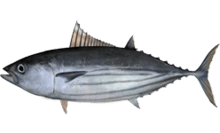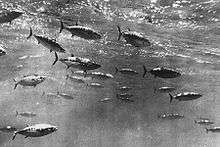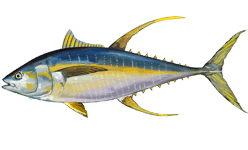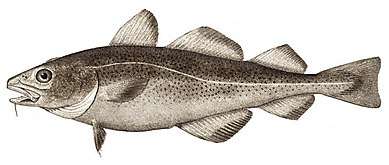Skipjack tuna
The skipjack tuna (Katsuwonus pelamis) is a medium-sized perciform fish in the tuna family, Scombridae. It is otherwise known as the balaya, tongkol, arctic bonito, mushmouth, oceanic bonito, striped tuna, or victor fish. It grows up to 1 m (3 ft) in length. It is a cosmopolitan pelagic fish found in tropical and warm-temperate waters. It is a very important species for fisheries.[2]
| Skipjack tuna | |
|---|---|
 | |
_in_a_Philippine_fish_market.jpg) | |
| Scientific classification | |
| Kingdom: | Animalia |
| Phylum: | Chordata |
| Class: | Actinopterygii |
| Order: | Scombriformes |
| Family: | Scombridae |
| Subfamily: | Scombrinae |
| Tribe: | Thunnini |
| Genus: | Katsuwonus Kishinouye, 1915 |
| Species: | K. pelamis |
| Binomial name | |
| Katsuwonus pelamis | |
| Synonyms | |
| |
Description

It is a streamlined, fast-swimming pelagic fish, common in tropical waters throughout the world, where it inhabits surface waters in large shoals (up to 50,000 fish), feeding on fish, crustaceans, cephalopods, and molluscs. It is an important prey species for sharks and large pelagic fishes and is often used as live bait when fishing for Marlin. It has no scales, except on the lateral line and the corselet (a band of large, thick scales forming a circle around the body behind the head). It commonly reaches fork lengths up to 80 cm (31 in) and a weight of 8–10 kg (18–22 lb). Its maximum fork length is 108 cm (43 in) and maximum weight is 34.5 kg (76 lb). Ageing skipjack tuna is difficult, and the estimates of its potential lifespan range between 8 and 12 years.[2]
Skipjack tuna is a batch spawner. Spawning occurs year-round in equatorial waters, but it gets more seasonal further away from the equator. Fork length at first spawning is about 45 cm (18 in). It is also known for its potent smell.[2]
Fisheries

It is an important commercial and game fish, usually caught using purse seine nets, and is sold fresh, frozen, canned, dried, salted, and smoked. With reported landings of almost 2.6 million tonnes, it was second only to the Peruvian anchoveta as the world's most important captured fish species in 2009.[3] Countries recording large amounts of skipjack catches include the Maldives, France, Spain, Malaysia, Sri Lanka, and Indonesia.[4]
Skipjack is the most fecund of the main commercial tunas, and its population is considered sustainable against its current consumption.[5][6] Its fishing is still controversial due to the methodology, with rod and reel or fishery options being promoted as ecologically preferable.[7][8][9] Purse seine methods are considered unsustainable by some authorities due to excess bycatch, although bycatch is said to be much reduced if fish aggregation devices are not used.[10] These considerations have led to the availability of canned skipjack marked with the fishing method used to catch it.[11]
Skipjack is considered to have "moderate" mercury contamination. As a result, pregnant women are advised against eating large quantities.[12][13][14] In addition, skipjack's livers were tested globally for tributyltin contamination. TBT is an organotin compound introduced into marine ecosystems through antifouling paint used on ship hulls, and has been determined to be very toxic. About 90% of skipjack tested positive for contamination, especially in Southeast Asia, where regulations of TBT use are less rigorous than in Europe or the US.[15]
As food
Skipjack tuna is used extensively in Japanese cuisine, where it is known as katsuo (鰹/かつお). Besides being eaten seared (katsuo tataki (鰹のタタキ)) and raw in sushi and sashimi, it is also smoked and dried to make katsuobushi, the central ingredient in dashi (a common Japanese fish stock).[16] It is also a key ingredient in shuto.
In Indonesian cuisine, skipjack tuna is known as cakalang. The most popular Indonesian dish made from skipjack tuna is cakalang fufu from Minahasa. It is a cured and smoked skipjack tuna dish, made by cooking the fish after clipping it to a bamboo frame.[17] Skipjack known as Kalhubilamas in Maldives is integral to Maldivian cuisine.[18]
Skipjack tuna is an important fish in the Native cuisine of Hawaii (where it is known as aku) and throughout the Pacific islands. Hawaiians prefer to eat aku either raw as a sashimi or poke or seared like in the Japanese tataki style.[19]
References
Citations
- Collette, B.; Acero, A.; Amorim, A.F.; et al. (2011). "Katsuwonus pelamis". The IUCN Red List of Threatened Species. 2011: e.T170310A6739812. doi:10.2305/IUCN.UK.2011-2.RLTS.T170310A6739812.en.
- Collette, Bruce B.; Cornelia E. Nauen (1983). FAO species catalogue. Vol. 2. Scombrids of the world. An annotated and illustrated catalogue of tunas, mackerels, bonitos and other related species known to date (PDF). FAO Fisheries Synopsis. Rome: Food and Agriculture Organization of the United Nations. p. 137.
- FAO (Food and Agriculture Organization of the United Nations) (2011). Yearbook of fishery and aquaculture statistics 2009. Capture production (PDF). Rome: Food and Agriculture Organization of the United Nations. p. 27.
- Makoto Miyake; Naozumi Miyabe; Hideki Nakano (2004). Historical trends of tuna catches in the world. FAO Fisheries Technical Paper No. 467. Rome: Food and Agriculture Organization of the United Nations.
- "FishWatch: Atlantic Skipjack Tuna (Katsuwonus pelamis)". NOAA - National Oceanic and Atmospheric Administration. November 3, 2009. Retrieved 2009-11-12.
- "Skipjack tuna, purse seine caught". Blue Ocean Institute. Nov 11, 2009. Archived from the original on 2010-06-13. Retrieved 2009-11-12.
- courtesy of the Secretariat of the Pacific Community (November 2009). "BUSINESS: PACIFIC TOLD TO TAKE THE LEAD If region wants to conserve critical resource". Islands Business International. Retrieved 2009-11-12.
- "Pacific tries to show way in sustainable tuna fishing". ABC International - Radio Australia. Oct 23, 2009. Retrieved 2009-11-12.
- "Retailers' Guide to Sustainable and Equitable Pole and Line Skipjack". Greenpeace International. 27 April 2009. Retrieved 2009-11-12.
- "Tuna,Skipjack". Seafood Watch. Monterey Bay Aquarium. Archived from the original on 2014-08-19. Retrieved 2014-08-16.
- Schwartz, Ariel (2012-09-30). "How Safeway Ended Up Selling Cheap, Responsibly-Caught Store Brand Tuna". Fast Company. Retrieved 2014-08-16.
- Mercury Levels in Sushi. Americanpregnancy.org. Retrieved on 2013-08-22.
- Mercury Levels in Fish. NRDC. Retrieved on 2013-08-22.
- Advice for Pregnant Women on Fish Consumption concerning Mercury Contamination. Mhlw.go.jp (2003-06-03). Retrieved on 2013-08-22.
- Down, Steve. "Tuna is attuned to tin". Ezine. Retrieved 2014-04-28.
- Sperss, Phil. "How to prepare skipjack tuna for nigiri sushi". lapetitnoisette.
- "Cakalang Fufu Jadi Pilihan di Sulut" (in Indonesian). MediaIndonesia.com. 15 July 2011. Archived from the original on 1 January 2013. Retrieved 1 June 2012.
- Prince, Rose (11 March 2010). "Tuna fishing in the Maldives: the fairest catch". The Telegraph. Retrieved 13 April 2011.
- "Skipjack Tuna (Aku)". Hawaii Seafood. Retrieved 2020-01-14.
Sources
- Pacific skipjack tuna NOAA FishWatch. Retrieved 5 November 2012.
- Western Atlantic skipjack tuna NOAA FishWatch. Retrieved 5 November 2012.
External links

- Photos of Skipjack tuna on Sealife Collection




.png)
